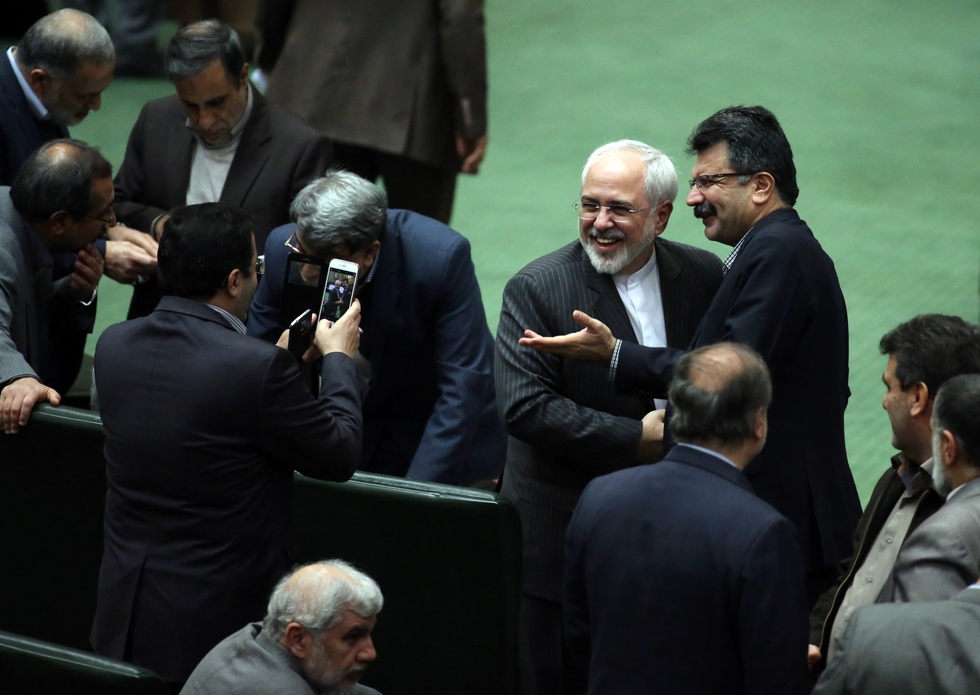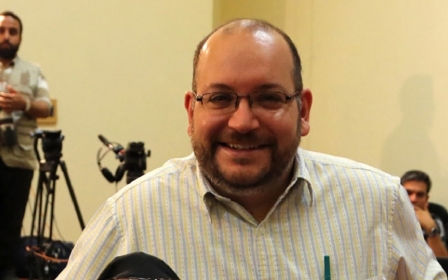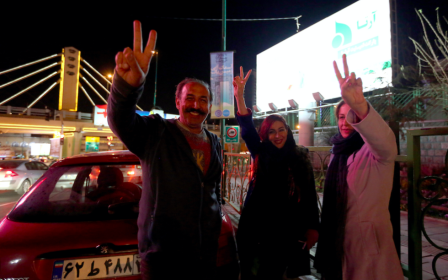ANALYSIS: Hardliners' nuclear deal posturing can't hurt Iran optimism

TEHRAN - After years of diplomatic wrangling and months of anticipation, the "Implementation Day" of Tehran's nuclear agreement with world powers, the moment that so many Iranians had been looking forward to, finally arrived late on Saturday in Vienna - early Sunday in Iran.
Following the hotly anticipated announcement from the International Atomic Energy Agency (IAEA) that Iran has complied with all sections of the nuclear deal it made with world powers, many sanctions against Iran will now be lifted. In light of the move, trade is expected to swell, and the energy, manufacturing and finance sectors are all expected to benefit. As much as $100bn in frozen foreign assets also look set to be released.
Since the first days of Hassan Rouhani’s victory in the presidential election of 2013, many Iranians have been looking forward to this day, hoping that the new approach brought in by the his administration would help bring about the end of sanctions and strengthen Iran's efforts to bolster its image and influence on the international stage.
Rouhani has made the issue and the deal the lynchpin of his presidency, assigning the country’s best and most skilled diplomats to the nuclear cause.
But challenges remain, and while Rouhani and his so-called reformist camp at present have the upper hand in Iran - and are expected to be bolstered further in upcoming parliamentary elections due to the success of the nuclear deal - the country’s hardliners still wield great influence and are widely expected to work to undermine Rouhani and the deal.
As the news of the deal broke, Iran’s state TV, which is controlled by hardliners, barely covered the subject, keeping reports on the issue to a minimum.
“The fact is that the hardliners are seeking to devalue the nuclear deal,” Saeed Hosseini, a political analyst, told Middle East Eye. “They are looking for ways to convince people that reaching the nuclear agreement is not a big deal.
“They are working to devalue the deal, with the hopes that this will prevent the moderates and reformists’ victory in the upcoming parliamentary election [slated for February],” he said.
However, many Iranians, especially those within the business community and the country’s urban areas, remain positive and believe that the hardliners will prove to be on the wrong side of history.
Mojtaba Eslamizade, an investment company owner, told MEE that “the lifting of the sanctions will affect my job positively”.
“I can now buy new and modern technologies and transfer them to Iran. Before this, there was no solution for doing financial transactions, and that is a poison for traders.”
Throughout Saturday, as news broke that the sanctions would soon be lifted, a heavier than usual police presence was seen in Tehran, where many expected large-scale celebrations to take place.
Previous landmarks in the agreement between Iran and the P5+1 (US, Britain, China, Russia, France and Germany) that took place in April and July last year saw thousands flock to the streets to express their joy, but while people gathered eagerly around televisions, computers, and radios to hear the final announcement this weekend, it did not come until Sunday at around 2am in Iran (22.00GMT).
Instead, people used social networks to express their happiness. In a move that may signal the importance of the deal implementation for Iranians, some pictures started circulating after the announcement that compared the easing of sanctions with the Shah leaving the country in 1979.
Amir Jafari, an acclaimed actor, took to Instagram to express his joy. “To the envy of some persons, the deal is implemented," he wrote.
Moreover, a few minutes after the announcement, Rouhani also took to Twitter to praise Iranians for their patience over the decade of sanctions the country has suffered due to the nuclear issue. (Iran faces other sanctions for its alleged support of terrorist groups and human rights abuses which will not be lifted and were not part of the deal).
The president also released a brief video of himself during presidential election, promising people that he would solve the nuclear crisis using a combination of moderation and prudence.
The mood coming out of Rouhani’s camp was clearly nothing short of jubilant. Mohammad Nahavandian, President Rouhani’s chief of staff, appeared close to tears on TV as he thanked the Iranian nation and its 77 million citizens for their endurance during the hard times.
Many Iranians also took the opportunity to highlight Rouhani’s apparent statesmanship over what they said was the mismanagement and crude leadership style of his predecessor president Mahmood Ahmadinejad, during whose tenure from 2005 to 2013 the sanctions regime was expanded.
“Ahmadinejad’s performance resulted in unprecedented sanctions against us, and that made our country have many setbacks,” Abbas Rezaie, a political science student, told MEE.
“Now, we are at the point that we were before Ahmadinejad’s eight-year presidency. I think the Iranian nation should never forgive Ahmadinejad for his mistakes.”
Khabar Online, a moderate news agency in Iran, also criticized Ahmadinejad and his camp for describing the UN Security Council resolutions against Iran as torn papers, and it praised Rouhani’s efforts to bring about a conclusion of the nuclear issue.
“Finally, the 12-year sanctions - which were the results of the so called torn papers - have been brought to an end, and those torn papers are now a part of history," the agency said.
New MEE newsletter: Jerusalem Dispatch
Sign up to get the latest insights and analysis on Israel-Palestine, alongside Turkey Unpacked and other MEE newsletters
Middle East Eye delivers independent and unrivalled coverage and analysis of the Middle East, North Africa and beyond. To learn more about republishing this content and the associated fees, please fill out this form. More about MEE can be found here.




